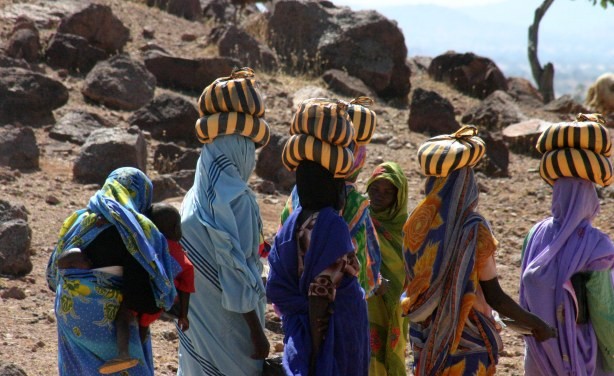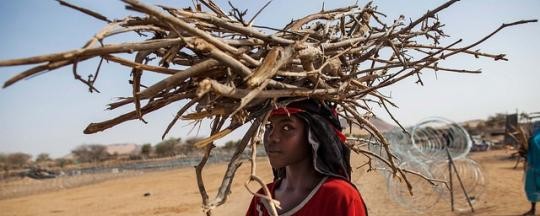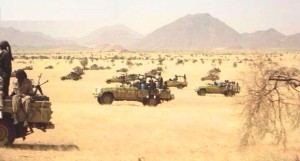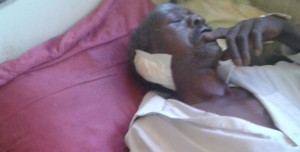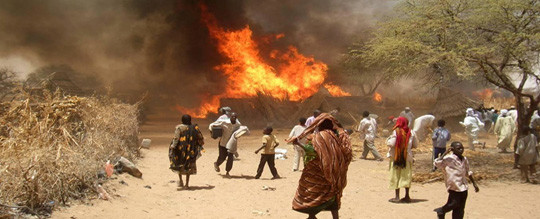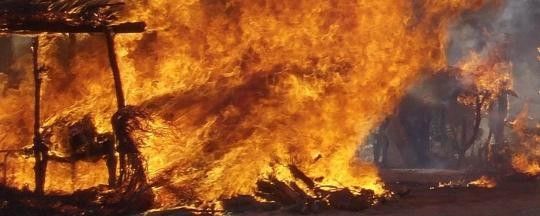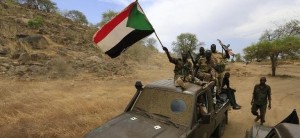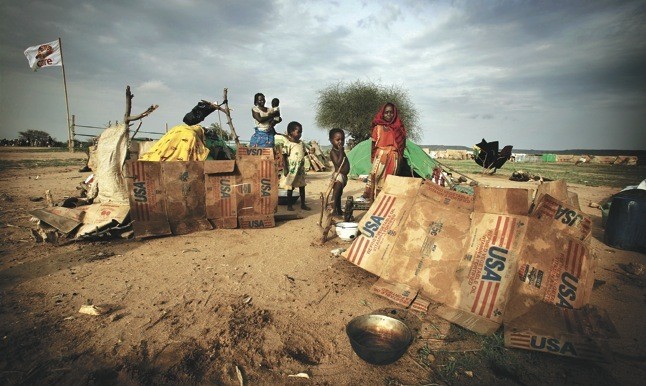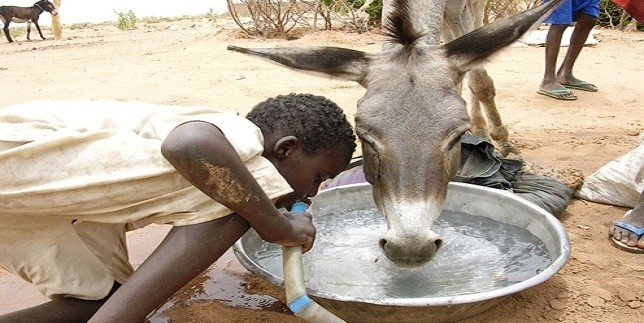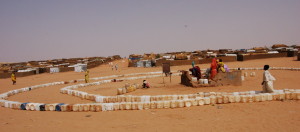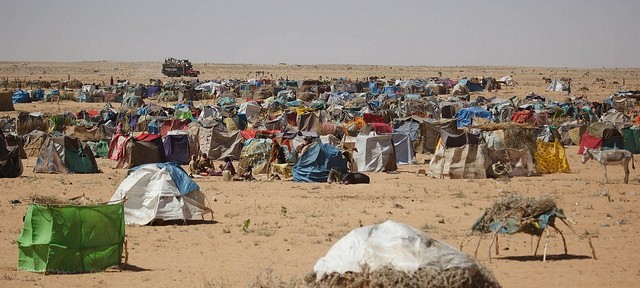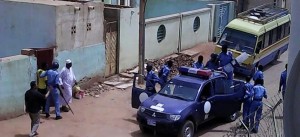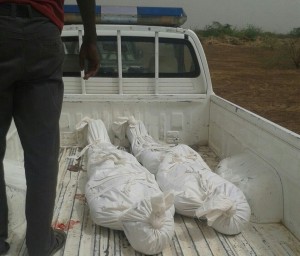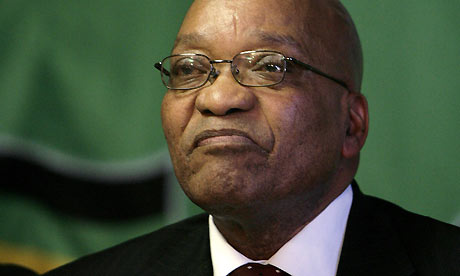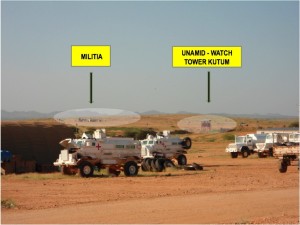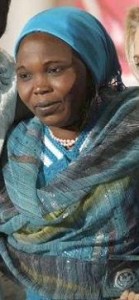This seventeenth installment of Darfur: Radio Dabanga News Digest has as its primary concern the continuing deterioration of civilian security and humanitarian capacity and access. As many as 130,000 Darfuris have been newly displaced this year (Agence France-Presse [UN/New York], 10 June 2015), and Radio Dabanga reports that lands abandoned by African Darfuris have been occupied by Arab farmers and pastoralists from Chad, Mali, and Niger. This substantially increases the difficulty of achieving any real peace in Darfur and directly contradicts the Khartoum regime’s justification for closing the camps for displaced persons: the region is “safe” and those in the camps should return to their homes. This “importing” or encouraging of foreign Arab farmers/pastoralists to replace displaced non-Arab/African land owners is of longstanding and has received far too little attention from UNAMID and the international community. The issue figures nowhere in the reports of the Department of Peacekeeping Operations to the Security Council, in part because Khartoum makes verification of the land “transfers” virtually impossible.
Additionally, there are dispatches from both Radio Dabanga and other news sources discussing the implications of President Omar al-Bashir’s trip to and escape from South Africa, with the connivance of the South African government. There are also several dispatches that address the growing political repression in Khartoum in the face of intensifying opposition to the National Islamic Front/National Congress Party regime and the collapsing economy over which it presides. A number of dispatches appear only with title, date, and URL.
It is important to understand the geography of violence and displacement in Darfur, and much that is reported by the UN is misleading in this respect. There is understandable emphasis on what is occurring in North Darfur, where fighting between combatants is concentrated, and South Darfur where militia violence is also intense. But what is now “Central Darfur” (formerly part of the “old” West Darfur) has seen tremendous violence as well, reported regularly by Radio Dabanga (Khartoum denies access to much of Central Darfur to both UNAMID and humanitarians). And News Digest No. 15 focused on recent violence in the “new” West Darfur, an extensive chronicle of rape, killings, land appropriation, and deadly harassment that makes clear this is not a region from which a withdrawal of peacekeepers is appropriate. Violence in East Darfur has been defined chiefly by inter-tribal fighting between the Rizeigat and Ma’aliya Arab tribes, and the fighting is very serious and appears to be intractable.
But insecurity is the dominant theme in Darfur, as Edmond Mulet—UN Assistant Secretary General for Peacekeeping Operations—informed the Security Council in a June 10, 2015 briefing. Mulet highlighted a “precarious situation,” defined by the following features:
• A sharp increase in violence by armed assailants against UNAMID and humanitarian personnel;
• The second phase of Khartoum’s military offensive, “Operation Decisive Summer,” has resulted in large numbers of newly displaced people;
• Insecurity on the ground is aggravated by broader political tensions, paramilitary groups and militias, as well as the proliferation of small arms and inadequate responses by local authorities;
• Criminality is major source of insecurity, with various armed forces taking advantage of the current situation and absence of security forces to attack civilians;
To understand the specifics of these categories of violence and insecurity, Radio Dabanga remains the indispensable resource (Sudan Tribune has also offered a number of important dispatches this week; these are in addition to the extraordinary “Wikileaked” Saudi Arabian diplomatic cables).
[For previous (weekly) Radio Dabanga Digests, see:
Darfur: Radio Dabanga Digest, Number 1 | http://wp.me/p45rOG-1CD
Darfur: Radio Dabanga Digest, Number 2 | http://wp.me/p45rOG-1De
Darfur: Radio Dabanga Digest, Number 3 | http://wp.me/p45rOG-1Dt
Darfur: Radio Dabanga Digest, Number 4 | http://wp.me/p45rOG-1Ei
Darfur: Radio Dabanga Digest, Number 5 | http://wp.me/p45rOG-1EL
Darfur: Radio Dabanga Digest, Number 6 | http://wp.me/p45rOG-1Fp
Darfur: Radio Dabanga Digest, Number 7 | http://wp.me/p45rOG-1FL
Darfur: Radio Dabanga Digest, Number 8 | http://wp.me/s45rOG-6452
Darfur: Radio Dabanga Digest, Number 9 | http://wp.me/p45rOG-1Gi
Darfur: Radio Dabanga Digest, Number 10 | http://wp.me/p45rOG-1Gt
Darfur: Radio Dabanga Digest, Number 11 | http://wp.me/p45rOG-1Hq
Darfur: Radio Dabanga Digest, Number 12 | http://wp.me/p45rOG-1HY
Darfur: Radio Dabanga Digest, Number 13 | http://wp.me/p45rOG-1Ia
Darfur: Radio Dabanga Digest, Number 14 | http://wp.me/p45rOG-1II
Darfur: Radio Dabanga Digest, Number 15 | http://wp.me/p45rOG-1Ji
Darfur: Radio Dabanga Digest, Number 16 | http://wp.me/p45rOG-1JU
Darfur: Radio Dabanga Digest, Number 17 | http://wp.me/p45rOG-1Kp—and below
Excepting the particularly important first dispatch from Radio Dabanga, reports are organized under the following headings:
[1] VIOLENCE TARGETING CIVILIANS IN DARFUR
[2] HUMANITARIAN ISSUES AFFECTING DARFURIS
[3] POLITICAL DISPATCHES OF NOTE
[4] UNAMID: INTIMIDATED BY KHARTOUM AS A MEANS OF ENSURING AL-BASHIR’S ESCAPE FROM SOUTH AFRICAN LEGAL SCRUTINY?
[5] IMPENDING MANDATE RENEWAL FOR UNAMID
[6] ECONOMIC NEWS
[All emphases in all quoted material (in bold) have been added; all editorial comments are in italics, in blue, with my initials following; a useful and quite recent administrative map of Darfur appears here.)—ER]
Eric Reeves, 21 June 2015
*************
Perhaps the most important dispatch of the week from Radio Dabanga, certainly concerning the long-term prospects for peace in Darfur, is the following:
• Thousands of foreign settlers take plots in East Jebel Marra | June 19, 2015 | Shangil Tobaya
A settlement program has started in East Jebel Marra. According to several reports from villagers, up to ten thousand newcomers have taken plots in deserted areas. The newcomers were identified by local pastoralists as members of Arab militias and migrants from Chad, Mali and Niger. Several eyewitnesses told Radio Dabanga that they have spotted the Rapid Support Forces roaming around to protect the new inhabitants.
More than hundred thousand people from East Jebel Marra, mainly Fur, have abandoned their homes after government bombardments and Rapid Support Forces attacked their places. Witnesses narrated their recent visit to specific areas were they saw how their land has been occupied by foreigners. The specific areas mentioned are Dali, Masalit, Sharafa, Tangarara, Nimera, Dolma, Um Guji, Hilat Aduma, Ar Ashu and Hemeida. The newcomers brought their livestock with them including, cows, sheep and goats.
The government of Sudan, while negotiating the exit of the joint mission UNAMID‘s peacekeepers in Darfur, told the UN last week, that is will close the internally displaced people camps to encourage people to return to their home villages. The policy of resettlement contradicts the guarantees for a safe return, the displaced farmers told Radio Dabanga…
One of the displaced investigators [who] went to inspect his home area said that the seized area protected by Rapid Support Forces (RSF) stretches as far north as Mount Shushu and to the south [as far as] Shangil Tobaya. To the west the RSF is monitoring the movements of all citizens up to the village of Mara and in the east to Abu Zereiga, being south of El Fasher.
[This encouraged immigration of Arab populations from neighboring countries certainly comports with the memorandum coming from the North Darfur headquarters of notorious Janjaweed leader Musa Hilal in August 2004: “Change the demography of Darfur,” and “empty it of African tribes”—ER]
VIOLENCE TARGETING CIVILIANS IN DARFUR
• Fourteen women raped by militants in North Darfur | June 15, 2015 | Tabit / Korma
Several incidents involving rape occurred in East Jebel Marra, in North Darfur, over the weekend. Fourteen women in total were sexually assaulted at the hands of militiamen, witnesses told Radio Dabanga. Pro-government militiamen, moving in three vehicles and on camels, attacked a group of women inside Hillet Ahmed, 6km south of Tabit, on Sunday. At about 8pm, they took six women out of their home and the village and raped them. The women, four of them married and two unmarried, were not released until early next morning, a witness reported to Radio Dabanga.
These women, returning from market, are extremely vulnerable to sexual assault
On Saturday, government-backed militiamen riding on camels assaulted seven women who were out to fetch water west of Hillet Ahmed. All of them were raped at the water well. The mother of one of the rape victims told Radio Dabanga that the victims and their relatives in the village went out to report both incidents to the military garrison in Tabit. But the soldiers did not respond, nor move to chase down the perpetrators.
A woman was raped in Korma, El Fasher locality, when she was preparing farmland to cultivate during the agricultural summer season, at the hands of members of the Border Intelligence Guards. The guards beat her and other women working at the farm badly, resulting in the serious injuries of three of them. Korma is close to a base of the joint African Union-United Nations Mission in Darfur.
A young woman safely returns from gathering firewood necessary for cooking; far too many women do not return or return only after enduring brutal sexual assaults
A relative of the rape victim added that the Border Guards then threatened the people in Korma that anyone who would go out to cultivate their farmland will be beaten. Women will be raped. They demanded that the land is meant for the grazing of livestock, not for farming. Years of conflict in Darfur have caused that many men have left or perished in battles with soldiers, rebels or militias. The household in rural Darfur is therefore marked by their absence, and women often have to fend for themselves when it comes to growing crops.
[This fundamental shift in the organization of Darfuri families and social collectives has had and will continue to have profound effects and diminishes the chances for peace—ER]
Sudanese army forces from the nearby garrison raped more than 200 women and girls in Tabit for two consecutive nights, at the end of October and the beginning of November 2014. The soldiers then explained that they were ordered to do so, in search for a missing colleague. The men of Tabit were detained and threatened so the soldiers had a free rein in sexually assaulting the women in the village. Human Rights Watch confirmed the reports, first made by Radio Dabanga, on 11 February. It described the situation in Tabit as like “living in an open prison.”
[The catastrophic epidemic of rape and sexual violence has yet to command of the international community a response remotely appropriate to the scale of fear and suffering defining the lives of women and girls throughout Darfur. UNAMID has been particularly ineffective in responding to the epidemic of sexual violence—ER]
• Militiamen in Darfur assault women, threaten residents | June 17, 2015 | Mukjar, formerly West Darfur
In North Darfur, pro-government militia members assaulted and robbed three women on Tuesday. Militiamen have threatened to burn down a town in Central Darfur in case the residents do not pay them. The women were severely beaten and whipped, causing them various injuries. They were on their way from Dali village in East Jebel Marra, to Shangil Tobaya, at Jurabel El Rai area, at the time of the attack. One of the victims told Radio Dabanga that the gunmen robbed them of the money and properties in their possession, along with the three donkeys they were riding, and then left them in the open.
Khartoum’s militia forces, primarily the Rapid Support Forces, are heavily armed and equipped by the regime. The have wrought havoc throughout Darfur, especially in North Darfur.
Pro-government militiamen threatened to pillage and burn down Mukjar market in Central Darfur if the residents do not pay them SDG220,000 ($3,666) as a compensation for their camel’s death near a farm in the area.
[The contrived nature of the new “Central Darfur” (formerly part of West Darfur) is suggested by the fact that Mukjar Locality borders Chad—in the far west of Darfur—ER]
• Militia cut off both ears of a man in Darfur defending his cattle | June 19, 2015 | Niertete [formerly West Darfur]
Three uniformed militia members have cut off the ears of a man in Niertete, Central Darfur, for defending his cattle against the intruders. The armed men took Ali Ahmed Zakariya, known as Ali Du, from inside his house at El Umda district in Niertete in Central Darfur. Before cutting off his ears, they were beating him. A relative of Ali Du told Radio Dabanga that the three men are belonging to a pro-government militia.
Radio Dabanga was able to obtain a photograph of the victim of this savage attack.
[The sheer brutality of the crimes committed against innocent civilians in Darfur by armed elements of Khartoum’s genocidal counter-insurgency campaign should still shock—ER]
• No human casualties in Central Darfur air raid | June 18, 2015 | Rokoro / Tawila
The Sudanese Air Force bombed three areas, north and west of Rokoro, in Central Darfur, without causing any casualties among residents, on Wednesday morning. Hillet Ahmed in North Darfur was reportedly shaken again by a sexual assault on women. A spokesman for the rebel SLM-AW said that the aerial bombardment was aimed at Dar El Aman, Kara, and Solo. According to Mustafa Tambur, a number of animals were killed and some tracts of land were burned. Tambur appealed to the UN Security Council to impose a no-fly zone over Darfur, in order to protect civilians.
Villages are frequently set on fire by Khartoum’s aerial bombardment and indiscriminate artillery shelling
• “Five wounded in Central Darfur market raid by militia”: witnesses | June 18, 2015 | Zalingei
An attack on the grand market of Zalingei, capital of Central Darfur, has resulted in the injuring of five people and the disappearance of a large amount of valuables, according to witnesses on Wednesday… A witness revealed to Radio Dabanga that it was in fact “new recruits” who were robbing shops and people inside the commercial market. “The attack came from about 200 militia members […] prepared for integration into the Sudanese army.” He reported that the new recruits from the Sudanese army, whom he claimed received training at Infantry 21, entered the market on foot. They started beating shop owners at around 8.30am, before pillaging their shops.
• Sudan regains control of Rokoro at the cost of civilian lives | June 16, 2015 | Rokoro / Sileia
Government forces regained control of Rokoro in Central Darfur on Monday afternoon, from the months-long grip of the Sudan Liberation Movement led by Abdel Wahid El Nur. Fighting reportedly resulted in the death of seventeen civilians.
In the centre of East Jebel Marra, fighting between the SLM-AW and the paramilitary Rapid Support Forces renewed for a second day nearby the rebels’ military base in Ruvata. The battle lasted five hours, according to spokesman Mustafa Tambour. He said that they were able to force the RSF to flee towards Fanga, leaving behind “thirteen dead and two Land Cruisers loaded with weapons.”
The SLM-AW has been actively engaged in fighting the Sudanese Armed Forces and allied militias over the past week in Rokoro area. This has triggered frequent aerial bombardments by the Sudanese Air Force. In villages northeast of Rokoro, thirteen civilians were killed by shelling, and four by aerial bombardments by the Sudanese Air Force and Armed Forces on Monday. Multiple witnesses reported to Radio Dabanga that the SAF from Fanga heavily shelled towards the direction of Rokoro, starting early morning. The shelling hit the villages of Ruvata, Burgo, Dabanara and Taringa. Besides killing twelve villagers, the attack created enormous damage and burned down several houses.
• Five people killed in violent incidents in South Darfur [and North Darfur] | June 16, 2015 | Gireida / Nyala / Tawila / Tabit
Five people were killed, and eight others were wounded in four separate incidents in South Darfur on Monday involving pro-government militiamen. A convoy in North Darfur came under the attack of militiamen on Sunday, during which one military staff was killed. Militiamen riding on camels and horses opened fire on a number of internally displaced people, who were tilling their farms at Nabagaya area, west of Gireida. Adam Saleh Abaker El Fida was killed on the spot. Abdelmajeed Abdelrahim Ibrahim and Suleiman El Amin sustained injuries. In Dugma, east of Gireida, pro-government militia members also attacked a group of displaced people. They managed to seriously wound Mohamed Abdallah Ibrahim and Mohamed Ali Yagoub.
Militiamen shot dead a young man, and robbed his phone, in El Tadamon district in Nyala, the capital of South Darfur. Meanwhile in a clash between militiamen and a local rescue team at Shataya in South Darfur, the militiamen killed three people and wounded four others. The team had attempted to retrieve a stolen vehicle.
On Sunday, militiamen attacked a convoy that was on its way from Tawila to El Fasher. One military staffer was killed, while six others were wounded. One of their vehicles was destroyed.
Omda Mukhtar Bosh, coordinator of camps for internally displaced people, informed Radio Dabanga about the incident. He added that the government-backed militiamen had been driving in a convoy that consisted of about 50 vehicles, varying from motorcycles to vehicles, and camels. “There were members of the army, the Popular Defence Forces, and the Central Reserve Forces. “Movement of commercial vehicles to and from Tawila has completely stopped.”
• “Villages shelled, Sudan forces killed in Central Darfur”: rebels | June 16, 2015 | Rokoro, formerly West Darfur
The armed rebel Sudan Liberation Movement, led by Abdel Wahid El Nur, has announced the killing of nineteen Sudanese military forces and militiamen near Fanga and near Rokoro, Central Darfur. The rebels reported that three villages were shelled, and residents fled on Monday.
On the same subject, Tambur revealed that a number of civilians were displaced because of the government troops’ and militiamen’s shelling of a number of villages in Central Darfur, with rockets and heavy artillery, on Monday. He pointed out that the residents of three villages have been displaced, after Dar El Aman, Rijad Solo, and Tara partially burned down. He appealed to humanitarian organisations in the area to accelerate the rescue of the victims, and provide them with assistance. The Sudanese Air Force bombed Solo and Dalo, west of Rokoro, last Thursday, according to the rebels’ spokesman.
A tremendous amount of Darfur has been destroyed by fire; arson is a weapon that has been used and will be used again in Khartoum’s efforts to empty the camps of internally displaced persons
• Three displaced wounded in militiamen’s attack in South Darfur | June 15, 2015 | Gireida, South Darfur
Militiamen attacked and injured three internally displaced people at Um Dafug area in South Darfur on Sunday. The three went out to till their farms in the area, 10 km west of Gireida town. They came across seven militia members on horses, who beat them seriously. A witness reported that they used axes… three persons, El Hadi Dudein, Mohamed Abkar, and Hanna Mohamed Aisha from Um Blolola camp, were taken to a hospital in Gireida for treatment.
• Militia leader Hemeti | June 17, 2015 | Nyala, South Darfur
Radio Dabanga and a Washington-based activist group have reported that former Border Guards commander Mohamed Hamdan Daglo (“Hemeti”) recruited large numbers of young Darfuris in September and October 2013, against the backdrop of Sudanese government officials announcement of a “decisive dry season campaign against all rebel forces in Sudan.” The about 6,000 recruits were trained as paramilitary troops, named Rapid Support Forces (RSF), in camps near Khartoum. They were sent to fight in South Kordofan, along with the Sudanese army. From the end of 2013 onwards, after widespread assaults against citizens in El Obeid [North Kordofan] and surrounding villages, the RSF were expelled from North Kordofan in February 2014 and re-stationed in Darfur “to fight rebel groups.” Thousands of people were displaced following the paramilitary attacks on villages in South Darfur.
Some of “Hemeti’s” forces
[This is a useful thumbnail sketch of the recent history of Khartoum’s primary militia force in Darfur, the Rapid Support Forces – ER]
• Four Darfuri students sentenced to whipping after clashes with NCP students | June 17, 2015 | Omdurman
Four students from Darfur, studying at the El Ahliya University in Omdurman, were sentenced to twenty whippings and fines… Last month, the security services arrested seven [Darfuri] students following clashes between Darfuri students and students who are members of the ruling National Congress Party’s youth movement. The security services accused them of breaching of public safety, and causing public nuisance.
The Darfur Students Association has said the attacks are part of a “racist campaign.” “About one third of the Darfuri students in the Sudanese capital have been subjected to beatings the last couple of weeks,” it reported during a press conference in May. “The number of Darfuri students who were wounded in attacks at Khartoum universities has risen to 221.”
• Sudan Appeal symposium strengthens anti-government position | June 17, 2015 | Omdurman
The leaders of the Sudan Appeal, a political communiqué by opposition parties, have denounced the targeting of Darfuri students in Khartoum and other cities, and stressed that the prosecution of President Omar Al Bashir before international courts will persist. The Sudan Appeal held a symposium at the National Umma Party’s headquarters on Sunday. The leaders stressed the need for the independence of universities, and allowing free political activities there.
HUMANITARIAN ISSUES
Eastern Chad continues to be one of the most under-reported humanitarian crises in the world today
• Food delayed in Bredjing Camp for Darfur in East Chad
The Sudanese refugees in the camps of eastern Chad are complaining about the reduction of food rations, high food prices and consumer goods at the start of the holy month of Ramadan. The Vice President of Bredjing Camp And Secretary of Women Affairs, Hawa Bakhit Adam, told Radio Dabanga that the food rations provided by UN agencies have been reduced to one plate of grain, approx. 2,5 kg of lentils per month. That is in total less than a pound of food products per person in a month [sic]. She said, there is also a delay in food rations distribution dates. The international NGOs and UN have adopted a policy to make the semi-permanent refugee population less dependent [on food aid]. The organizations also face funding constraints. Many men are working or living outside the camps and working in goldmines or elsewhere.
The food reduction is a gradual process. Hawa Bakhit Adam pointed out that the food prices in the markets [exceed] the refugees’ purchasing power. She appealed to the NGO’s working and the United Nations to speed up the delivery and provision of food to them.
A grim image from Bredjing camp, eastern Chad
Famine Early Warning System Network (FEWS Net) reports ominously:
• Food security to deteriorate in June as the lean season begins
According to the Famine Early Warning Systems Network Sudan Food Security Outlook May report, food security conditions are expected to deteriorate in June as the lean season begins and poor households start to rely more on markets for food. The areas of greatest concern are the conflict-affected areas of South Kordofan, Blue Nile and Darfur where displaced people and civilians without access to humanitarian assistance will face Crisis (IPC Phase 3) levels of food insecurity.
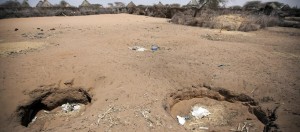 A looted “matmorra” (a hole used to keep grains during the dry season) in Tangarara (North Darfur), a village abandoned after government attacks
A looted “matmorra” (a hole used to keep grains during the dry season) in Tangarara (North Darfur), a village abandoned after government attacks
[These are, of course, the three areas of Sudan where the Khartoum regime is most aggressively obstructing or denying humanitarian relief, including food—ER]
There is little evidence that the world community is responding adequately to the dramatic increase in food insecurity in Sudan, particularly in Darfur:
• WFP voucher programme severely underfunded
Funding for WFP cash and voucher assistance is facing a severe shortfall, with a complete break in funding anticipated from July onwards. WFP estimates the extent of this funding shortfall at almost $24.8 million, including $18.4 million in transfer value for the next six months. In response, WFP has already halted a number of expansion plans and will likely cut rations in some locations for the month of June. If no urgent funds are mobilized however, WFP may have to further disrupt the voucher distribution cycle with more extensive ration cuts or even complete suspension of the programme. This puts almost 500,000 people, mostly IDPs, at risk of receiving no voucher assistance from September onwards. (OCHA Humanitarian Bulletin: Sudan (Issue, 22 | 25 – 31 May 2015)
• Ministry: Change response to Sudan’s measles outbreak | June 19, 2015 | Khartoum
The Sudanese Ministry of Health reported that a change in the response to the measles epidemic is needed, stressing that vaccination campaigns should not only cover affected localities. The total number of deaths in 2015 has risen to 38. The Ministry of Health confirmed 2,511 cases in Sudan as of 24 May, a rise of 12% since 3 May. 4,545 patients are suspected to suffer from measles, compared to 4,127 cases at the start of May. The under-15-years age group has the highest percentage of reported cases.
A change in the approach to responding to disease outbreaks is required, the Ministry of Health, World Health Organization (WHO) and the UN Children’s Fund (UNICEF) said. They recommended that vaccination campaigns should cover states in full and not only affected localities, and should ideally cover the whole country.
In May, the director of the Immunisation Department in East Darfur, Abdelrazeg El Dom, attributed the rise in measles mortality rates to poor government funding and the lack of vaccines.
[Sudan has been deeply negligent in responding to the threat of measles, a wildly contagious disease, for many years. In the cases of the Nuba Mountains (South Kordofan), Blue Nile, and much of Darfur, vaccination campaigns have not been mounted because of insecurity or Khartoum’s humanitarian blockade – ER]
• Water supply decreased by more than half in North Darfur city | June 18, 2015 | El Fasher
The director of the North Darfur water management announced that the daily water supply to El Fasher city has decreased by more than half. Engineer Noureldin Adam said that the supply reaches 17,000 cubic metres, instead of the required quantity of 39,000 cubic metres per day. He attributed the decrease to the depletion of the water from the Golo reservoir, and the fluctuation of the electricity supply. The North Darfur capital currently witnesses an acute crisis of drinking water, where the price of a barrel of water in some peripheral districts has amounted to SDG30 ($5). One week ago, the price was $3.40 in the less remote districts.
In far too many locations in Darfur, and in Sudan generally, there is not enough water for human consumption; many animals die of dehydration.
• South Darfur water crisis: Displaced queue for drinking water | June 21, 2015 | Girdeia, South Darfur
One of the affected camps residents informed Radio Dabanga that this crisis started last April and is still ongoing. He appealed to the local and state authorities, and the organisations working in the water field, to speed up solving their problem. Throughout Darfur and Sudan, crises of drinking water have emerged in the past weeks. Several areas in the capital of South Darfur, Nyala, have been without water owing to a number of broken pumps since mid-May. The water supply to El Fasher city, North Darfur, has decreased by more than half of the usual, the water management announced this week. Khartoum has also witnessed water outages, in one case leading to a street protest in El Kalakla Sanga’at district. Because of the shortages, the prices of barrels of water in these cities have risen sharply.
A powerful image of the imbalance between water supply and demand
[Crises in water supplies throughout Sudan have increased noticeably in the past year—a reflection of years of neglect of critical infrastructure by the regime – ER]
• Farmers in Sudan want to stop rise in cancer from pesticides | June 20, 2015 | Wad Medani
Farmers in Sudan request the authorities to review the licenses, registration and importing of pesticides. The Farmers’ Association of El Gezira and El Managel wants to stop the increase in cancer cases amongst farmers suspected to be caused by the use of certain pesticides and the way the chemicals are stored and transported. The farmers urgently request the authorities to review the licenses, registration and importing of pesticides.
[This is not and will not be a priority for a regime that has run the agricultural sector into the ground, particularly in the area of Wad Medani in Gezira, south of Khartoum—ER]
Displaced persons attempting to return to their homes too often go unreported when their efforts fail; this excerpt here from OCHA’s Humanitarian Bulletin: Sudan (Issue, 22 | 25 – 31 May 2015) is all too rare:
• IDPs to receive aid in Yassin town after unsuccessful return to Kweikai
An agreement was reached between OCHA and [Khartoum’s “Humanitarian Affairs Commission” for] East Darfur to provide assistance for the nearly 1,000 people from Kweikai village displaced in Yassin town. This week, Tearfund will distribute emergency shelters and household items to all 197 displaced households. The IDPs were meant to return to Kweikai village (about 10 km NW of Yassin town) on three previous occasions, but security issues in East Darfur made these attempts unsuccessful.
Numbers in Darfur are so large that they quickly overwhelm the statistical imagination and blur into one vast human catastrophe. Here is another excerpt, this from OCHA’s Humanitarian Bulletin: Sudan (Issue 19: 4 – 10 May 2015), giving a more comprehensible narrative of those non-Arab/African peoples caught up in the vast maelstrom of violence presently ongoing in North Darfur:
• On 10 May, an inter-agency team visited Hassahissa IDP camp in Zalingei, Central Darfur, to assess the health, food, education, and emergency household supply needs of 344 new arrivals whose villages were burnt down by militia groups in January and February 2015. Of the new arrivals, 290 had come from Funga [usually Fanga] in North Jebel Marra locality and 54 from Donkey Bashim in Kutum locality, North Darfur. The IDPs from Funga reported fleeing conflict between government forces and armed groups in January, after which they spent four months in the mountains in Nisacam area without any humanitarian assistance. They then moved on to Golo locality, before arriving in Hassahissa camp last week.
Persons newly displaced in North Darfur, near Zamzam camp (outside El Fasher)
[Four months of life in the forbidding mountain landscape of Darfur with no humanitarian assistance, having been violently driven from their homes by Khartoum’s regular and militia forces: such stories attach to the all too many Darfuri displaced persons – ER]
POLITICAL DISPATCHES OF NOTE
• US: Sudan still a sponsor of terrorism
U.S. State Department, 20 June 2015 | Washington, DC [excerpts]
Elements of al-Qa’ida-inspired terrorist groups are still in Sudan, the US State Department writes in its Country Report on Terrorism 2014 being released on Friday. Sudan also continued to allow members of Hamas to travel, fundraise, and live in Sudan.
The US remained unsuccessful in keeping an accomplice in the January 1, 2008 killing of two US Embassy staff members in jail for the full 12 years of his sentence. The Sudan government paroled him and did not refer the decision despite protests by the US. The convicted killers escaped from Kober prison, and only one has been recaptured.
[Let us be specific here: on January 1, 2008 assassins murdered U.S. Agency for International Development diplomat John Granville and USAID employee Abdelrahman Abbas Rahama; their murderers, though apprehended, were allowed by Khartoum’s security services to escape from the notorious Kober Prison, generally regarded as “escape-proof” without insider assistance—ER]
 John Granville, murdered in Khartoum, January 1, 2008
John Granville, murdered in Khartoum, January 1, 2008
Despite ratifying the UN Convention Against Corruption, the Central Bank of Sudan did not freeze, seize or forfeit assets in 2014 of any listed person. As the Sudanese banks face difficulties to find correspondent banks to process international transactions, most Sudanese instead move money in cash.
The Country report on Sudan highlights that Sudan “has yet to take concrete steps to resolve the crisis in the ‘Two Areas’ of Southern Kordofan and Blue Nile, to include ending aerial bombardments, allowing sufficient and sustained humanitarian access, and resuming political dialogue to resolve the conflicts.”
[Significantly, if predictably, the State Department report takes no account of the extraordinary revelations of the leaked minutes August 31, 2014 meeting of senior military and security officials in Khartoum. There are repeated discussions of a “strategic relationship with Iran,” of the regime’s close relationship with radical Islamists and support for Islamist insurgencies (e.g., in Libya), and of the critical intelligence on terrorist activities that Khartoum is withholding—ER]
• NISS confiscates three newspapers in Khartoum | June 18, 2015 | Khartoum
• Two newspaper print-runs seized this weekend in Sudan’s capital | June 14, 2015 | Khartoum
The print-run of Al Ayam newspaper in Khartoum was confiscated on Saturday. Sudan’s National Intelligence and Security Services also seized copies of Al Youm Al Tali newspaper on Friday, without giving any reasons.
• Darfur Regional Authority’s term extended | June 15, 2015 | Khartoum
[The Darfur Regional Authority has failed, as even its leaders admit. It serves as fig-leaf of “success” for the Doha Document for Peace in Darfur, even as the DDPD is regarded as a diplomatic dead letter by Darfuris and an increasing number of international actors, although most won’t speak publicly about the DDPD, given their past enthusiastic support – ER]
• Press conference to clarify violent Friday protest in Khartoum | June 16, 2015 | Khartoum
People in El Gereif East in Khartoum plan to hold a press conference on Wednesday to clarify the circumstances of the bloody events on Friday, which claimed the lives of three people. Other demonstrators were wounded, and dozens were reportedly detained. A representative of El Gereif East, the Member of Parliament Mahdi Shamseldin, called for the formation of an independent commission to investigate the use of excessive force by the security authorities in their attempt to break up the peaceful protest on Friday.
Police in action against demonstrators in Khartoum; live ammunition and tear gas was used
Hundreds of residents in El Gereif East staged a peaceful demonstration last Friday and Saturday, to protest that the authorities have deprived plots from their owners. In an attempt to disperse the mass, the police fired live bullets and used tear gas. Three people were killed…
Two victims of the response by Khartoum’s security forces to a peaceful demonstration
• Sudanese opposition leaders call on EU to support “new peace process“ | Sudan Tribune | June 10, 2015 | Strasbourg
A delegation of the Sudanese opposition on Tuesday briefed EU legislators in Strasbourg on the situation in Sudan, and called for support to realise peace in Sudan. In an EU parliamentary hearing entitled “Sudan’s recent election and peace perspectives”, Malik Agar, chairman of the Sudan Revolutionary Front rebel alliance, and El Sadig El Mahdi, head of the National Umma Party (NUP), appealed to the EU parliamentarians to support the development of a new peace process and democratic reforms in the country…
UNAMID IN DARFUR: INTIMIDATED TO ENSURE AL-BASHIR’S ESCAPE FROM SOUTH AFRICAN LEGAL SCRUTINY?
There has been a great deal of reporting on Omar al-Bashir’s fleeing South Africa and on the African National Congress-led government’s decision to ignore a court order that al-Bashir be held in the country pending a judicial review of an application by a nongovernmental legal group. There remain questions about the nature of Khartoum’s response to the uncertainty confronting al-Bashir’s status from Sunday (June 14) into Monday morning (June 15). News24, in a dispatch written by a respected South African journalist, reported that the South African troops in Darfur felt threatened by the actions of Khartoum’s Sudan Armed Forces, although the exact nature of these actions has not been sufficiently clarified. How intimidating these actions were can, of course, be understood only by those who were on the ground. Denials of any intimidation come from South Africa, Khartoum, the UN, and SPLA/iO rebel leader Riek Machar (who of course cites only his long friendship with the men in Khartoum as the basis for his conclusion). But all these actors have a motive for wishing that any intimidation not be reported, although the motives are different in each case.
South African president Jacob Zuma has taken his country into dangerous territory with a flagrant violation of the rule of law that led to the escape of ICC-indicted génocidaire Omar al-Bashir, president of the Khartoum regime.
The dispatch that set in motion the debate about the meaning of Khartoum’s unusual troop movements was by Erika Gibson, a very well respected journalist writing for News24. It is highly doubtful that the quotes in the dispatch were fabricated, and Gibson has insistently stood by her original story. We are unlikely to learn precisely what occurred during this tense period for South African soldiers:
• South African troops “held hostage” in Sudan over al-Bashir | Erika Gibson, Netwerk24 | June 16, 2015
Johannesburg – The Sudanese government of president Omar al-Bashir literally held a gun to South Africa’s head to secure his safe return to Khartoum. Netwerk24 can reveal that about 800 South African soldiers in Darfur were held “hostage” by Sudanese troops when the drama around Al-Bashir’s possible arrest in South Africa escalated. According to military experts, this effectively means Sudan blackmailed South Africa and the soldiers’ lives served as a guarantee for Al-Bashir’s safe return. Only after Al-Bashir safely touched down in Khartoum on Monday, were Sudanese troops withdrawn. President Jacob Zuma is the commander-in-chief of the defence force.
“We were so scared – we were surrounded by soldiers. We handed out extra ammunition to all our troops in case they needed it,” said one South African soldier in Sudan on Tuesday. The deployment of Sudanese troops and threats against South Africa started shortly after Al-Bashir left for the African Union summit in Sandton, Johannesburg. He arrived on Saturday night. Heavily armed Sudanese soldiers surrounded military bases in Kutum, Mellit, and Malha [only the base at Mellit has any protective fortification – ER]. South African troops were placed in a state of combat readiness. “Vehicles approached our bases and the commander placed us on State 2 of readiness,” said another soldier. This meant all troops had to be in combat gear, fully armed, and positioned in bunkers and against embankments.
Another soldier said if the situation got out of hand, “we would have had to surrender to save our lives, because you can’t fight a country’s army with a poorly equipped battalion.” The South African National Defence Force (SANDF) has been battling for years to get proper combat gear and armoured vehicles to its troops in Darfur. The delivery has consistently been blocked by the Sudanese government, which, on more than one occasion, prohibited South African flights from entering its airspace. “I am so thankful that South Africa did not arrest Bashir. The battalion commander said after Bashir touched down safely in Khartoum, all the [Sudanese] troops were withdrawn. The calamity has returned to normal,” reads a message sent by a soldier in Darfur to his friends in South Africa. At a briefing last week, SA army chief Lieutenant-General Vusi Masondo said the Sudanese troops and rebels in that country were much better equipped than the South Africans, which made it difficult to maintain order.
“Our nerves were shot and we were very relieved when the militants withdrew on Monday evening. We knew we were sitting ducks,” said a South African soldier.
UNAMID said it was unaware of the situation. Zuma’s spokesperson Harold Maloka referred all questions to the SANDF, which did not respond. Military expert Helmoed-Römer Heitman said if the events were true, it was blatant intimidation. “Our troops in Darfur are already vulnerable. They’ve been led into traps numerous times and had their weapons confiscated. “If there was a confrontation, I have no doubt that the South Africans would have returned in body bags. They have been deployed as peacekeepers, not as combat troops. “If the threatening situation is confirmed, South Africa has no other option than to withdraw its troops from such an impossible situation,” Heitman said.
The view of the incident from Darfur:
• Darfur’s displaced demand trial South African president | June 16, 2015 | El Fasher / Khartoum
The internally displaced people living in camps in Darfur have praised the independent decision of the High Court in South Africa, which ruled that the government should have arrested President Omar Al Bashir before he left the country on Monday afternoon. In Sudan, demands are voiced to punish the South African president for allowing Al Bashir to escape.
• Bashir escape: “Sad day for South Africa, a blow to the rule of law” | June 15, 2015 | Johannesburg / The Hague / Washington / Khartoum
• Analysis: Six questions on Al Bashir escaping arrest in South Africa | June 15, 2015 | Khartoum
• Sudan army threatened South African peacekeepers to ensure release Bashir | June 16, 2015 | Johannesburg
• Al Bashir narrowly escapes arrest in South Africa | June 15, 2015 | Pretoria
• South African army denies that Sudan army was threatening its peacekeepers | June 16, 2015 | Johannesburg
• Bashir court case: President escapes South Africa against court order | June 15, 2015 | Washington / Khartoum
• US embassy warns its citizens in Sudan over Al Bashir case | June 15, 2015 | Washington / Khartoum
• South African army denies that Sudan army was threatening its peacekeepers | June 16, 2015 | Johannesburg
• Darfur’s displaced demand trial South African president | June 16, 2015 | El Fasher / Khartoum
• Darfuri refugees in Chad “reassured” by court ruling for Bashir’s arrest | June 17, 2015 | Eastern Chad
The man so many Darfuris and Darfuri refugees—and Sudanese from all regions—wish to see in The Hague. The South African government has betrayed them all…
MANDATE RENEWAL FOR UNAMID
Khartoum’s recent actions, and the catalyzing effect of the need to re-authorize UNAMID by means of a Security Council resolution, have produced some useful responses:
• [Khartoum’s deputy ambassador to the UN] called for progress in negotiating the exit strategy but Mulet made clear that this was “linked to results and concrete improvement of the situation on the ground.” The United Nations has set out benchmarks for Sudan to address the Darfur crisis as a condition for winding down the UNAMID mission.
“Now is not the time to abandon the people of Darfur,” a US official said following closed-door consultations at the council. “It would be irresponsible for the UN Security Council and AU Peace and Security Council to give in to the demands of Khartoum for a premature exit, or even partial withdrawal, of this peacekeeping force, given the ongoing humanitarian and security crisis,” said the official, who asked not to be named. (Agence France-Presse [UN/New York], May 10, 2015)
• Sudan worried about extension UN mandate Darfur | June 19, 2015 | Khartoum / New York
Sudan has become growingly worried that the Security Council will extend its mandate in Darfur. Sudan had asked the UN to leave Sudan, soon after reports on alleged mass rape in Darfur had been published. On Friday, June 19, the Council members will participate in a closed meeting on the human rights situation in Darfur. Sudan wants the peacekeepers to leave the country, but the Secretary General of the UN is determined to continue as the situation in Darfur is deteriorating.
[Khartoum wants UNAMID to withdraw in order that in may complete its “changing of the demography of Darfur” without interference or witnesses – ER]
• UN will not end “dysfunctional” peacekeeping mission in Darfur | June 11, 2015 | Khartoum / New York
The UN Assistant Secretary-General for Peacekeeping Operations, Edmond Mulet, told the 15-member Security Council on Wednesday that there has been negligible progress in the peace efforts for Darfur. Late last year, Sudan ordered the peacekeeping mission in Darfur (UNAMID) to prepare an exit strategy, but Mulet made it clear that the UN-AU forces will not leave soon. He noted that the second phase of the government’s “Decisive Dry Season” (para)military campaign, that began end December last year to end the rebellion, has caused a new wave of displacement across the region. Humanitarian organisations estimate the number of newly displaced this year at more than 78,000, while the UN cited unverified reports of more than 130,000 people, whose homes were attacked since January 1.
A diplomat speaking to Al Jazeera channel has described UNAMID as “the most dysfunctional peacekeeping mission in the world.”
UNAMID in “inaction” as civilians are threatened–earning its reputation as “the most dysfunctional peacekeeping mission in the world (see above)
“UN officials will tell you privately that the actions of the Sudanese government constitute one of the reasons why UNAMID is not working,” said Al Jazeera’s Diplomatic Editor James Bays, reporting from the UN headquarters in New York.
[The assessment in bold above hardly constitute news: these are facts that have been well documented for years. But the timing of such blunt language, and the linking of UNAMID’s failure to Khartoum’s obstructive, harassing, and destructive behavior undermine the regime’s various claims that things have improved in Darfur, security is an issue in only a few small pockets of the region, and that it is safe for people return to their (typically destroyed) homes and villages. Rape—particularly the mass rape of more than 220 girls and women in Tabit, North Darfur—has become impossible to ignore entirely, despite the efforts of the UN Secretariat prior to the Tabit incident – ER]
Khartoum is pushing back on the renewal of UNAMID’s mandate, even though the odds are presently strongly in favor of re-authorization by the Security Council. Sudan Tribune reports:
• Sudan summons British ambassador over UNAMID mandate renewal | June 18, 2015 (KHARTOUM) – Sudanese foreign ministry Thursday summoned the British ambassador to Khartoum, Peter Topper, to express its concern over a draft resolution submitted to the UN.
• UN refuses to sign agreement on UNAMID’s exit strategy: Sudan | June 15, 2015 (KHARTOUM) – The Sudanese government said the United Nations has retracted from an agreement reached by the tripartite team on an exit strategy for the hybrid peacekeeping mission in Darfur (UNAMID).
For his part, the spokesperson for the foreign ministry, Ali al-Sadiq, said the ambassadors of the UNSC permanent members admitted that UNAMID must eventually exit and that there is no disagreement on the exit strategy. UNAMID deputy joint special representative Abdul Kamara was summoned by Sudan’s foreign ministry last Thursday to inform him of the government discomfort and disappointment of false and erroneous information contained in Ki-moon’s report. Also, the Sudanese deputy ambassador to the UN, Hassan Hamid Hassan, on Wednesday accused the UN secretary-general and the UN peacekeeping department of seeking to provide a distorted picture about the security situation in Darfur. He criticized the assistant secretary-general for peacekeeping operations for attributing the recent displacement of civilians, which is caused by the tribal clashes, to the government military campaign on rebel groups.
[Such gross misrepresentation of Darfur’s realities is of course pure propaganda, a way of presenting itself as the aggrieved party within the Arabic and Islamic worlds. Too many will give credence to this preposterous assessment. One can only imagine the terrible distortions that Khartoum will offer if there is no UN presence to check even the most outlandish lies – ER]
The voice of someone from Darfur who courageously spoke to the UN Security Council:
• Sudanese civilians [from Darfur] ask Security Council for protection June 20, 2015 | New York
Hawa ‘Jango’ Abdalla Mohamed Salih urged [Security Council] members to keep the UNAMID peacekeeping mission in Sudan “until other international forces are able to protect the civilians in Darfur.” In an interview with Radio Dabanga she narrated her testimony in the UN Security Council explaining what she had experienced as an internally displaced person in Abu Shouk camp in North Darfur. She asked the members of the Security Council to impose a no-fly zone in Darfur, the Nuba Mountains and Blue Nile to protect civilians. “These people are facing indiscriminate aerial bombings on almost a daily basis. The Security Council should also order Sudan to allow international aid organizations to provide humanitarian support, like food, protection, shelter and clean water to the people in Darfur without the requirement for a prior government approval.”
Hawa ‘Jango’ Abdalla Mohamed Salih has demonstrated more courage than legions of UN diplomats
ECONOMIC NEWS
In addition to a continual stream of reports of bread shortages and cooking and automotive fuel shortages—clear evidence that the Central Bank of Sudan simply has no Forex remaining—the two dispatches below warrant attention. They indicate the knock-on effects of the highly inflationary environment throughout Sudan, and the unconscionable complacency of the International Monetary Fund (IMF):
• Reduced opening hours gas station in Ramadan causes surge in transportation cost | June 19, 2015 | El Geneina
Sharply rising sugar, oil and meat prices have hit celebrations for the holy month of Ramadan in the various states of Darfur. In some areas even the cost of public transportation has tripled. The prices are varying per state, but according to Dabanga reporters, some food prices went up with 20% to 40%. In El Geneina a bag of sugar has gone up to 370 SDG, while in Nyala customers pay 340 SDG. Vehicle owners in West Darfur state are witnessing an acute fuel crisis, where the price of a gallon of gasoline in the black market has surged to 75 SDG and diesoline to 50 SDG a gallon. One of the truck owners told Radio Dabanga that the authorities and station owners have allowed only two hours per day for opening the petrol stations. The cars have to line up before 8 a.m. in order to get fuel before the stations close at 10 a.m. As a result, the fare for local public transportation has tripled from 1 to 3 SDG.
Inflation is accelerating in Sudan, and the official government figure of 24 percent inflation is completely untenable. This doesn’t prevent the IMF from giving Khartoum its seal of approval, as reported by Sudan Tribune:
• IMF approves of Sudan economic reform policies | June 17, 2015 (KHARTOUM) – The International Monetary Fund (IMF) gave its blessings to the economic reforms carried out by the Sudanese government, an official here said today. Sudan’s economy has suffered an economic shock after it lost 75% of the country’s oil reserves following the secession of South Sudan in July 2011, which subsequently led to soaring inflation levels and the sharp decline of the local currency value relative to major currencies. The Sudanese Finance Minister Badr al-Din Mahmoud urged the IMF to support Sudan in achieving further economic reforms…
[But of course the Khartoum regime is making only token reforms, or simply reporting data from the Central Bureau of Statistics to make it seem as though reforms are taking place (the IMF takes CBS figures at face value, without scrutiny or assessment). The IMF provides no meaningful oversight of the Sudanese economy – ER]
*******************************
“The victims [of the Holocaust] perished not only because of the killers, but also because of the apathy of the bystanders. What astonished us after the torment, after the tempest, was not that so many killers killed so many victims, but that so few cared about us at all.”
[Elie Wiesel, “Why were there so few?”]
